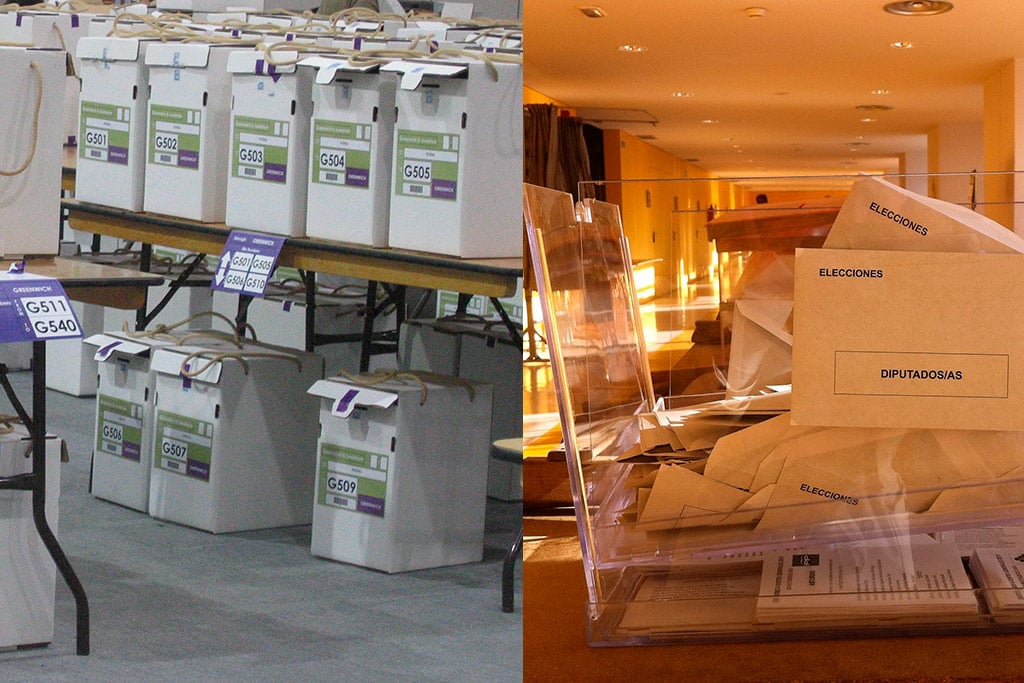
Spaniards rightly complain they have had four general elections in the last four years, a record for an EU country, because politicians have been unable to form a sustainable government, while the British are equally fed up with their politicians, albeit for very different reasons (Brexit). In both cases, part of the discontent lies with the electoral systems in each country. The UK uses the first-past-the-post system (FPTP), sometimes described as winner takes all, under which the candidate who wins the most votes (but not necessarily a majority) in single-member or multiple-member constituencies is elected.
FPTP has given Britain stable single-party majority governments with both the Conservatives and Labour tending to last their full five-year term in office until 2017 when Teresa May called a snap election in the hope of winning a bigger majority (which did not happen) and Boris Johnson called an election for 12 December. If one includes the 2015 general election and the 2016 Brexit referendum, Brits have gone to the polls as many times as Spaniards in the last four years.
FPTP is used in around one-third of countries, notably in the US and also in Canada and India. MPs serve the constituency they campaign in. This makes them more inclined to be in touch with local issues and tackle local problems. The larger parties and those with more geographically concentrated support, however, gain a disproportionately large share of seats, while smaller parties with more evenly distributed support are left with a disproportionately small share.
The UK’s Electoral Reform Society says FPTP is “bad for voters, bad for government and bad for democracy.” David Cameron, prime minister between 2010 and 2016, said the proportional representation (PR) system would allow people into parliament who did not finish first in their constituency in an election and would create a “parliament full of second-choices who no one really wanted but didn’t really object to either”.
In return for the support of the Liberal Democrats in a coalition government, Cameron agreed to a referendum in 2011 on the so called Alternative Vote system (often called Instant Runoff Voting in the US), which is not a form of PR and is designed to deal with vote splitting. It was rejected by 67% of those who voted.
Spain uses the d’Hondt system of proportional representation (PR), which has also produced stable governments, with the Socialists and Popular Party alternating in power and tending to last their full four-year term in office until 2015 when the political system fragmented with the entry into parliament of two new parties, Podemos and Ciudadanos, and later VOX. Sixteen parties are represented in Congress, up from 13 after April’s general election, compared to six that won seats in the last UK election.
The PR system is more representative of the electorate and delivers fairer treatment of minority parties and independent candidates. It encourages people to vote and reduces apathy: fewer votes are “wasted” as more people’s preferences are taken into account. It rarely produces an absolute majority for one party and often leads to greater consensus in policy-making. Spain has had majority governments on several occasions and for both the Socialists and the PP, not so much because of the d’Hondt system but because of the small size of many provinces where only the largest parties tend to compete.
The disadvantages of the PR system are that it makes it easier for extreme parties to gain representation, it can create political gridlock (as in Spain) and it favours compromise and coalitions which are not always the wisest course when a strong majority government is required to push through much needed reforms (which some would argue is what Spain needs at the moment).
In Belgium, the negotiations required after the 2010 election to form a governing coalition took 18 months to complete, leaving a government where nothing got done. Ironically, the UK has had a coalition government (2010-2015), while Spain only looks like getting one now if the pact between the Socialists and Unidas Podemos prospers and gains sufficient support in parliament.
So, which is the fairer system, FPTP or PR? As more parties enter national politics (three in Spain in the last four years) and one, in particular, in the UK (UKIP/Brexit Party), so PR seems the juster way to elect members of parliament. UKIP, the precursor of the Brexit Party, won 3.9 million votes in the 2015 election and just one out of a total of 650
MPs, while the Liberal Democrats won 2.4 million votes and eight MPs, the same number as the Democratic Unionist Party, which only fields candidates in Northern Ireland and won 184,260 votes.
In Spain’s latest election, there were also peculiarities. The radical Basque party EH Bildu, in favour of independence for the Basque Country, won five of the 350 seats in Congress with 276,519 votes, while another party on the political extreme, the Catalan anti-capitalist CUP, gained two seats with only 31,765 fewer votes than EH Bildu. VOX’s 3.6 million votes gave it 52 seats, while the 3 million of Unidas Podemos gave the party 35.
In the current fraught climate, Spain could do with a dose of FPTP as it might provide a stable government that lasts four years, while the UK could do with PR to bring into parliament parties that have considerable support but are rarely first part the post. No electoral system is perfect.


